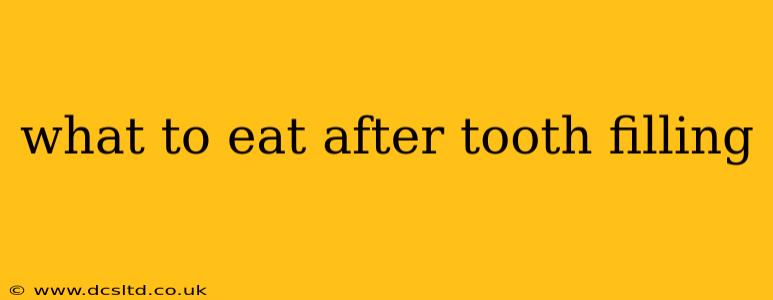Getting a tooth filling is a common dental procedure, but knowing what to eat afterward is crucial for a smooth recovery. The right diet can prevent complications and promote healing. This guide will cover everything you need to know about post-filling nutrition, including addressing common questions people have about this topic.
What Should I Eat After Getting a Tooth Filling?
Immediately after your filling, it's best to stick to soft foods. This gives the anesthetic time to wear off and allows the filling to settle. Think creamy soups, yogurt, applesauce, mashed potatoes, and well-cooked pasta. These foods are gentle on the newly filled tooth and won't put excessive pressure or stress on the area. Avoid anything crunchy, chewy, or hard for at least the first 24 hours.
What Foods Should I Avoid After a Tooth Filling?
Certain foods should be avoided in the initial days following a filling to prevent dislodging it or irritating the area. This includes:
- Hard foods: Nuts, hard candies, popcorn, ice, and raw vegetables can damage or dislodge your filling.
- Chewy foods: Caramel, taffy, gum, and tough meats require excessive chewing, potentially stressing the filled tooth.
- Sticky foods: Sticky candies, dried fruits, and certain gummy candies can pull at the filling and increase the risk of it coming loose.
- Extremely hot or cold foods and drinks: These can cause sensitivity in the filled tooth, which is common in the days following the procedure. Start with lukewarm beverages.
How Long Should I Avoid Certain Foods After a Tooth Filling?
The length of time you need to avoid certain foods depends on the type of filling and your dentist's instructions. Generally, it's advisable to stick to soft foods for at least 24 hours, while avoiding hard, chewy, and sticky foods for several days. Your dentist will provide specific guidance tailored to your situation.
Can I Eat Ice Cream After a Tooth Filling?
Ice cream is a tricky one. While it's soft, the extreme cold can cause sensitivity in the treated area. It's best to wait until the sensitivity subsides before indulging in frozen treats. If you do choose to eat ice cream, let it soften slightly before eating.
What if My Filling Feels Loose After Eating?
If your filling feels loose or you experience any pain, swelling, or discomfort, contact your dentist immediately. Don't delay seeking professional help if you notice any issues.
What About Normal Diet After a Tooth Filling?
After a few days, you can gradually reintroduce your normal diet, but remember to continue practicing good oral hygiene. Brush and floss gently around the filled tooth to prevent food particles from getting trapped.
Are There Any Specific Nutritional Needs After a Filling?
There aren't any specific nutritional needs beyond maintaining a balanced diet. Good nutrition contributes to overall oral health, which is important for a successful filling. Ensure you have enough calcium and vitamin D for strong teeth and bones.
By following these guidelines and listening to your body, you'll ensure a smooth recovery and maximize the longevity of your new filling. Remember, consulting your dentist for personalized advice is always best.
